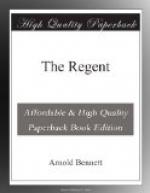The Pianisto was the best, partly because, like the vacuum-cleaner, it could be operated by electricity, and partly because, by means of certain curved lines on the unrolling paper, and of certain gun-metal levers and clutches, it enabled the operator to put his secret ardent soul into the music. Assuredly it had given Edward Henry a taste for music. The whole world of musical compositions was his to conquer, and he conquered it at the rate of about two great masters a month. From Handel to Richard Strauss, even from Palestrina to Debussy, the achievements of genius lay at his mercy. He criticized them with a freedom that was entirely unprejudiced by tradition. Beethoven was no more to him than Arthur Sullivan—indeed, was rather less. The works of his choice were the “Tannhaeuser” overture, a potpourri of Verdi’s “Aida,” Chopin’s Study in Thirds (which ravished him), and a selection from “The Merry Widow” (which also ravished him). So that on the whole it may be said that he had a very good natural taste.
He at once liked Chopin’s Funeral March. He entered profoundly into the spirit of it. With the gun-metal levers he produced in a marvellous fashion the long tragic roll of the drums, and by the manipulation of a clutch he distilled into the chant at the graveside a melancholy sweetness that rent the heart. The later crescendoes were overwhelming. And as he played there, with the bright blaze of the chandelier on his fair hair and beard, and the blue cigar smoke in his nostrils, and the effluence of the gilded radiator behind him, and the intimacy of the drawn window-curtains and the closed and curtained door folding him in from the world, and the agony of the music grieving his artistic soul to the core—as he played there he grew gradually happier and happier, and the zest of existence seemed to return. It was not only that he felt the elemental, unfathomable satisfaction of a male who is sheltered in solitude from a pack of women that have got on his nerves. There was also the more piquant assurance that he was behaving in a very sprightly manner. How long was it since he had accomplished anything worthy of his ancient reputation as a “card,” as “the” card of the Five Towns? He could not say. But now he knew that he was being a card again. The whole town would smile and forgive and admire if it learnt that—
Nellie invaded the room. She had resumed the affray.
“Denry!” she reproached him, in an uncontrolled voice. “I’m ashamed of you! I really am!” She was no longer doing the dignified. The mask was off and the unmistakable lineaments of the outraged mother appeared. That she should address him as “Denry” proved the intensity of her agitation. Years ago, when he had been made an alderman, his wife and his mother had decided that “Denry” was no longer a suitable name for him, and had abandoned it in favour of “Edward Henry.”
He ceased playing.
“Why?” he protested, with a ridiculous air of innocence. “I’m only playing Chopin. Can’t I play Chopin?”




